

Omegaflex peri

Ask a doctor about a prescription for Omegaflex peri

How to use Omegaflex peri
Leaflet attached to the packaging: information for the user
Omegaflex peri
Infusion emulsion
Please read the contents of the leaflet carefully before using the medicine, as it contains
important information for the patient.
- –You should keep this leaflet, so you can read it again if you need to.
- –If you have any doubts, you should consult a doctor, pharmacist, or nurse.
- –This medicine has been prescribed specifically for you. Do not pass it on to others. The medicine may harm another person, even if their symptoms are the same.
- –If the patient experiences any side effects, including any side effects not listed in this leaflet, they should tell their doctor, pharmacist, or nurse. See section 4.
Table of contents of the leaflet
- 1. What is Omegaflex peri and what is it used for
- 2. Important information before using Omegaflex peri
- 3. How to use Omegaflex peri
- 4. Possible side effects
- 5. How to store Omegaflex peri
- 6. Contents of the packaging and other information
1. What is Omegaflex peri and what is it used for
Omegaflex peri contains fluids and substances called amino acids, electrolytes, and fatty acids, which are necessary for the growth of the body or for recovery. It also contains calories in the form of carbohydrates and fats.
Omegaflex peri is indicated for use in children over two years of age, adolescents, and adults.
The patient receives Omegaflex peri when they cannot normally eat. This can happen in many situations, for example, when the patient is recovering from surgery, injuries, or burns, or when they cannot absorb food from the stomach and intestines.
2. Important information before using Omegaflex peri
When not to use Omegaflex peri
- –if the patient is allergic to any active substance, eggs, peanuts, soy, fish, or any of the excipients of this medicine (listed in section 6);
- –this medicine must not be given to newborns, infants, and young children under two years of age.
Omegaflex peri should not be used if the patient has any of the following conditions:
- life-threatening circulatory disorders, such as those occurring in shock or collapse;
- heart attack or stroke;
- severe coagulation disorders, bleeding risk (severe coagulopathy, worsening bleeding disorders);
- blockage of blood vessels by blood clots or fat (thromboembolism);
- severe liver failure;
- disorders of bile flow (intrahepatic cholestasis);
- severe kidney failure in the absence of renal replacement therapy;
- electrolyte imbalance;
- fluid or water deficit in the body;
- fluid in the lungs (pulmonary edema);
- severe heart failure;
- certain metabolic disorders, such as:
- –excess lipids (fats) in the blood,
- –congenital amino acid metabolism disorders,
- –abnormally high blood sugar levels requiring more than 6 units of insulin per hour,
- –metabolic disorders that may occur after surgical procedures or injuries,
- –coma of unknown origin,
- –inadequate tissue oxygenation,
- –abnormally high levels of acidic substances in the blood.
Warnings and precautions
Before starting treatment with Omegaflex peri, you should discuss it with your doctor.
You should tell your doctor if:
- the patient has heart, liver, or kidney problems;
- the patient has certain metabolic disorders, such as diabetes, abnormal blood fat levels, and fluid and electrolyte balance disorders or acid-base balance disorders.
During treatment with this medicine, the patient will be closely monitored to detect early signs of an allergic reaction (such as fever, chills, rash, or shortness of breath).
To ensure that the patient's body is properly processing the administered nutrients, further observations and tests will be performed, such as various blood sample tests.
Medical staff will also take measures to ensure that the patient's body has adequate fluid and electrolyte needs. In addition to Omegaflex peri, the patient will also receive other nutrients to fully meet their body's needs.
Children
This medicine must not be given to newborns, infants, and young children under two years of age.
Omegaflex peri and other medicines
You should tell your doctor about all medicines the patient is currently taking or has recently taken, as well as any medicines the patient plans to take.
Omegaflex peri may interact with some other medicines. You should tell your doctor if you are taking or receiving any of the following medicines:
- insulin;
- heparin;
- medicines that prevent unwanted blood clotting, such as warfarin or other coumarin derivatives;
- medicines that improve urine production (diuretics);
- medicines used to treat high blood pressure or heart disease (ACE inhibitors, angiotensin II receptor antagonists);
- medicines used in organ transplantation, such as cyclosporine and tacrolimus;
- medicines used to treat inflammatory conditions (corticosteroids);
- hormonal preparations that affect fluid balance (adrenocorticotropic hormone [ACTH]).
Pregnancy and breastfeeding
If the patient is pregnant or breastfeeding, thinks they may be pregnant, or plans to have a child, they should consult their doctor before using this medicine. If the patient is pregnant, they will only receive this medicine if their doctor considers it absolutely necessary for their treatment. There is no data on the use of Omegaflex peri in pregnant women.
Breastfeeding is not recommended for mothers receiving parenteral nutrition.
Driving and using machines
This medicine is usually given to patients who are bedridden in a hospital or clinic, which excludes driving and using machines. However, the medicine itself does not affect the ability to drive and use machines.
If you have any further doubts about using this medicine, you should consult your doctor or pharmacist.
Omegaflex peri contains sodium
The medicine contains 0.931 mg/ml of sodium (the main component of common salt). This corresponds to 0.047% of the maximum recommended daily sodium intake in the diet for adults.
If it is necessary to use one or more bags per day for a longer period, patients, especially those controlling their sodium intake, should consult their doctor or pharmacist.
3. How to use Omegaflex peri
This medicine is given by intravenous infusion (drip), i.e., through a thin tube directly into a vein. This medicine will be administered through one of the smaller (peripheral) or larger (central) veins. The recommended infusion time for a single bag of emulsion for parenteral nutrition is a maximum of 24 hours.
The doctor will decide how much of this medicine the patient needs and how long they will require treatment with this medicine.
Use in children
This medicine must not be given to newborns, infants, and young children under two years of age.
The doctor will decide how much of this medicine the child needs and how long they will require treatment with this medicine.
Using more than the recommended dose of Omegaflex peri
If the patient receives too much of this medicine, they may experience an overload syndrome and the following symptoms may occur:
- fluid and electrolyte imbalance;
- fluid in the lungs (pulmonary edema);
- loss of amino acids in the urine and amino acid imbalance;
- vomiting, nausea;
- chills;
- increased blood sugar levels;
- glucose in the urine;
- fluid deficit;
- significantly higher levels of blood components than normal (hyperosmolality);
- disorders or loss of consciousness due to extremely high blood sugar levels;
- enlargement of the liver (hepatomegaly) with or without jaundice;
- enlargement of the spleen (splenomegaly);
- fat deposition in internal organs;
- abnormal liver function test results;
- decreased red blood cell count (anemia);
- decreased white blood cell count (leukopenia);
- decreased platelet count (thrombocytopenia);
- increased number of immature red blood cells (reticulocytosis);
- breakdown of red blood cells (hemolysis);
- bleeding or tendency to bleed;
- coagulation disorders (which can be determined by changes in bleeding time, clotting time, prothrombin time, etc.);
- fever;
- increased blood fat levels;
- loss of consciousness.
If any of these symptoms occur, the infusion should be stopped immediately.
4. Possible side effects
Like all medicines, this medicine can cause side effects, although not everybody gets them.
The following side effects may be serious. If you experience any of the following side effects, you should tell your doctor immediately, who will stop the administration of the medicine to the patient:
Rare (may affect up to 1 in 1000 people):
- allergic reactions, such as skin reactions, shortness of breath, swelling of the lips, mouth, and throat, and respiratory disorders.
Other side effects:
Common (may affect up to 1 in 10 people)
- irritation or inflammation of the veins (phlebitis, thrombophlebitis)
Uncommon (may affect up to 1 in 100 people):
- nausea, vomiting, loss of appetite
Rare (may affect up to 1 in 1000 people):
- increased tendency to blood clotting,
- blue discoloration of the skin,
- shortness of breath,
- headache,
- hot flashes,
- redness of the skin (flushing),
- sweating,
- chills,
- feeling cold,
- high body temperature,
- drowsiness,
- chest, back, bone, or lumbar pain,
- decreased or increased blood pressure.
Very rare (may affect up to 1 in 10,000 people):
- abnormally high levels of fat or sugar in the blood,
- high levels of acidic substances in the blood,
- excessive fat can lead to a fat overload syndrome. More information is provided in section 3 "Using more than the recommended dose of Omegaflex peri". Symptoms usually resolve after stopping the infusion.
Unknown (frequency cannot be estimated from the available data):
- decreased white blood cell count (leukopenia),
- decreased platelet count (thrombocytopenia),
- disorders of bile flow (cholestasis).
Reporting side effects
If you experience any side effects, including any side effects not listed in this leaflet, you should tell your doctor, pharmacist, or nurse. Side effects can be reported directly to the Department of Adverse Reaction Monitoring of Medicinal Products, Medical Devices, and Biocidal Products:
Al. Jerozolimskie 181C,
02-222 Warsaw,
tel.: 22 49-21-301, fax: 22 49-21-309,
Website: https://smz.ezdrowie.gov.pl
Side effects can also be reported to the marketing authorization holder.
Reporting side effects will help to gather more information on the safety of this medicine.
5. How to store Omegaflex peri
The medicine should be stored out of sight and reach of children.
Do not store above 25°C.
Do not freeze. If accidental freezing occurs, the bag should be discarded.
Store the bag in an outer protective bag to protect it from light.
Do not use this medicine after the expiry date stated on the label. The expiry date refers to the last day of the month stated.
6. Contents of the packaging and other information
What Omegaflex peri contains
The active substances of the ready-to-use mixture are:
| from the upper chamber (glucose solution) | in 1000 ml | in 1250 ml | in 1875 ml | in 2500 ml |
| Glucose monohydrate which corresponds to glucose content | 70.40 g 64.00 g | 88.00 g 80.00 g | 132.0 g 120.0 g | 176.0 g 160.0 g |
| Sodium dihydrogen phosphate dihydrate | 0.936 g | 1.170 g | 1.755 g | 2.340 g |
| Zinc acetate dihydrate | 5.280 mg | 6.600 mg | 9.900 mg | 13.20 mg |
| from the middle chamber (fat emulsion) | in 1000 ml | in 1250 ml | in 1875 ml | in 2500 ml |
| Triglycerides of saturated fatty acids with medium chain length | 20.00 g | 25.00 g | 37.50 g | 50.00 g |
| Purified soybean oil | 16.00 g | 20.00 g | 30.00 g | 40.00 g |
| Omega-3 fatty acid triglycerides | 4.000 g | 5.000 g | 7.500 g | 10.00 g |
| from the lower chamber (amino acid solution) | in 1000 ml | in 1250 ml | in 1875 ml | in 2500 ml |
| Isoleucine | 1.872 g | 2.340 g | 3.510 g | 4.680 g |
| Leucine | 2.504 g | 3.130 g | 4.695 g | 6.260 g |
| Lysine hydrochloride which corresponds to lysine content | 2.272 g 1.818 g | 2.840 g 2.273 g | 4.260 g 3.410 g | 5.680 g 4.546 g |
| Methionine | 1.568 g | 1.960 g | 2.940 g | 3.920 g |
| Phenylalanine | 2.808 g | 3.510 g | 5.265 g | 7.020 g |
| Threonine | 1.456 g | 1.820 g | 2.730 g | 3.640 g |
| Tryptophan | 0.456 g | 0.570 g | 0.855 g | 1.140 g |
| Valine | 2.080 g | 2.600 g | 3.900 g | 5.200 g |
| Arginine | 2.160 g | 2.700 g | 4.050 g | 5.400 g |
| Histidine hydrochloride monohydrate which corresponds to histidine content | 1.352 g 1.000 g | 1.690 g 1.251 g | 2.535 g 1.876 g | 3.380 g 2.502 g |
| Alanine | 3.880 g | 4.850 g | 7.275 g | 9.700 g |
| Aspartic acid | 1.200 g | 1.500 g | 2.250 g | 3.000 g |
| Glutamic acid | 2.800 g | 3.500 g | 5.250 g | 7.000 g |
| Glycine | 1.320 g | 1.650 g | 2.475 g | 3.300 g |
| Proline | 2.720 g | 3.400 g | 5.100 g | 6.800 g |
| Serine | 2.400 g | 3.000 g | 4.500 g | 6.000 g |
| Sodium hydroxide | 0.640 g | 0.800 g | 1.200 g | 1.600 g |
| Sodium chloride | 0.865 g | 1.081 g | 1.622 g | 2.162 g |
| Sodium acetate trihydrate | 0.435 g | 0.544 g | 0.816 g | 1.088 g |
| Potassium acetate | 2.354 g | 2.943 g | 4.415 g | 5.886 g |
| Magnesium acetate tetrahydrate | 0.515 g | 0.644 g | 0.966 g | 1.288 g |
| Calcium chloride dihydrate | 0.353 g | 0.441 g | 0.662 g | 0.882 g |
| Electrolytes | in 1000 ml | in 1250 ml | in 1875 ml | in 2500 ml |
| Sodium | 40 mmol | 50 mmol | 75 mmol | 100 mmol |
| Potassium | 24 mmol | 30 mmol | 45 mmol | 60 mmol |
| Magnesium | 2.4 mmol | 3.0 mmol | 4.5 mmol | 6.0 mmol |
| Calcium | 2.4 mmol | 3.0 mmol | 4.5 mmol | 6.0 mmol |
| Zinc | 0.024 mmol | 0.03 mmol | 0.045 mmol | 0.06 mmol |
| Chloride | 38 mmol | 48 mmol | 72 mmol | 96 mmol |
| Acetate | 32 mmol | 40 mmol | 60 mmol | 80 mmol |
| Phosphate | 6.0 mmol | 7.5 mmol | 11.25 mmol | 15.0 mmol |
| Amino acid content | 32 g | 40 g | 60 g | 80 g |
| Nitrogen content | 4.6 g | 5.7 g | 8.6 g | 11.4 g |
| Carbohydrate content | 64 g | 80 g | 120 g | 160 g |
| Fat content | 40 g | 50 g | 75 g | 100 g |
| Energy from fat | 1590 kJ (380 kcal) | 1990 kJ (475 kcal) | 2985 kJ (715 kcal) | 3980 kJ (950 kcal) |
| Energy from carbohydrates | 1075 kJ (255 kcal) | 1340 kJ (320 kcal) | 2010 kJ (480 kcal) | 2680 kJ (640 kcal) |
| Energy from amino acids | 535 kJ (130 kcal) | 670 kJ (160 kcal) | 1005 kJ (240 kcal) | 1340 kJ (320 kcal) |
| Non-protein energy | 2665 kJ (635 kcal) | 3330 kJ (795 kcal) | 4995 kJ (1195 kcal) | 6660 kJ (1590 kcal) |
| Total energy | 3200 kJ (765 kcal) | 4000 kJ (955 kcal) | 6000 kJ (1435 kcal) | 8000 kJ (1910 kcal) |
Other ingredients are: citric acid monohydrate (to adjust pH), egg lecithin for injection, glycerol, sodium oleate, all-rac-α-tocopherol, sodium hydroxide (to adjust pH), and water for injection.
| Osmolality | 950 mOsm/ kg | 950 mOsm/ kg | 950 mOsm/kg | 950 mOsm/ kg |
| Theoretical osmolality | 840 mOsm/l | 840 mOsm/l | 840 mOsm/l | 840 mOsm/l |
| pH | 5.0–6.0 | 5.0–6.0 | 5.0–6.0 | 5.0–6.0 |
What Omegaflex peri looks like and what the packaging contains
The ready-to-use product is an infusion emulsion, i.e., it is an emulsion administered through a thin tube into a vein.
Omegaflex peri is supplied in flexible three-chamber bags containing:
- –1250 ml (500 ml amino acid solution + 250 ml fat emulsion + 500 ml glucose solution)
- –1875 ml (750 ml amino acid solution + 375 ml fat emulsion + 750 ml glucose solution)
- –2500 ml (1000 ml amino acid solution + 500 ml fat emulsion + 1000 ml glucose solution)
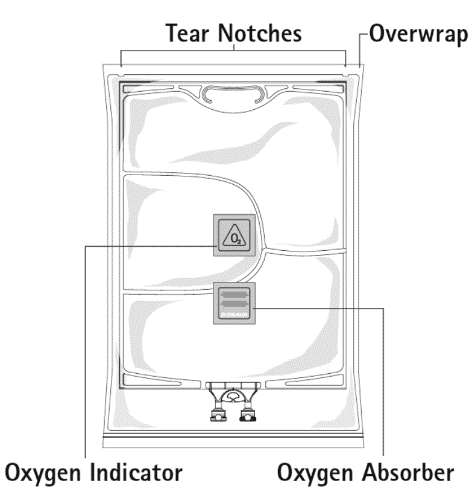
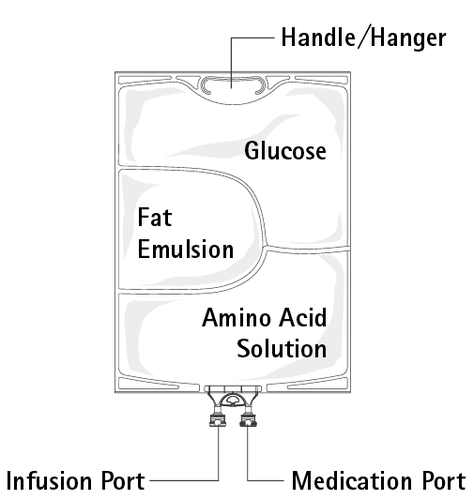
Figure A
Figure B
Figure A: The multi-chamber bag is packaged in an outer protective bag. Between the inner and outer bags, there is an oxygen absorber and an oxygen indicator; the oxygen absorber sachet is made of inert material and contains iron hydroxide.
Figure B: The upper chamber contains the glucose solution, the middle chamber contains the fat emulsion, and the lower chamber contains the amino acid solution.
The glucose solution and amino acid solution are clear and colorless to straw-colored. The fat emulsion is milky white.
The upper and middle chambers can be connected to the lower chamber by opening the internal welds. The different sizes of the packaging are supplied in cardboard boxes containing five bags. The packaging sizes are: 5 x 1250 ml, 5 x 1875 ml, and 5 x 2500 ml
Not all packaging sizes may be marketed.
Marketing authorization holder
- B. Braun Melsungen AG Carl-Braun-Straße 1 34212 Melsungen, Germany
Tel.:
+49-5661-71-0
Fax:
+49-5661-71-4567
Manufacturer
- B. Braun Melsungen AG Carl-Braun-Straße 1 34212 Melsungen, Germany
To obtain more detailed information about this medicine, you should contact the representative of the marketing authorization holder in Poland:
Aesculap Chifa sp. z o.o.
ul. Tysiąclecia 14
64-300 Nowy Tomyśl
Phone: +48 61 442 01 00
Fax: +48 61 443 75 05
Email: [email protected]
This medicine is authorized in the Member States of the European Economic Area and in the United Kingdom (Northern Ireland) under the following names:
Austria
Nutriflex Omega peri B.Braun Emulsion zur Infusion
Belgium
Nutriflex Omega peri, 32 g/l Amino + 64 g/l G, emulsie voor infusie
Bulgaria
Nutriflex Omega peri emulsion for infusion
Croatia
Nutriflex Omega peri emulzija za infuziju
Cyprus
Nutriflex Omega peri
Czech Republic
Nutriflex Omega peri
Denmark
Nutriflex Omega Peri
Estonia
Nutriflex Omega peri infusiooniemulsioon
Finland
Nutriflex Omega 32/64/40 perifer infuusioneste, emulsio
France
PERINUTRIFLEX OMEGA E, émulsion pour perfusion
Germany
NuTRIflex Omega peri novo Emulsion zur Infusion
Greece
Nutriflex Omega peri
Ireland
Omeflex peri emulsion for infusion
Italy
Nutriplus Omega AA32/G64
Lithuania
Nutriflex Omega peri infuzinė emulsija
Luxembourg
NuTRIflex Omega peri novo Emulsion zur Infusion
Latvia
Nutriflex Omega peri emulsija infūzijām
Netherlands
Nutriflex Omega peri 32 g/l Amino + 64 g/l G, emulsie voor infusie
Norway
Nutriflex Omega Peri infusjonsvæske, emulsjon
Poland
Omegaflex peri
Portugal
Nutriflex Omega peri emulsão para perfusão
Romania
NuTRIflex Omega Peri novo emulsie perfuzabilă
Slovakia
Nutriflex Omega peri
Slovenia
Nutriflex Omega peri 32/64 emulzija za infundiranje
Spain
Omegaflex peri emulsión para perfusión
Sweden
Nutriflex 32/64/40 perifer infusionsvätska, emulsion
United Kingdom (Northern Ireland) Omeflex peri emulsion for infusion
Date of last revision of the leaflet: 2024-01-19
Information intended for healthcare professionals only:
Before use, parenteral nutrition products should be visually inspected for any signs of damage, color changes, and emulsion instability.
Do not use damaged bags. The outer and inner bags, as well as the welds between the chambers, should be intact. The product should only be used if the amino acid and glucose solutions are clear and colorless to straw-colored, and the fat emulsion is homogeneous in a milky white color. Do not use if the solutions contain solid particles.
After mixing the contents of the three chambers, do not use if the emulsion shows discoloration or signs of phase separation (oil droplets, oil layer). If the emulsion shows discoloration or signs of phase separation, the infusion should be stopped immediately.
Before opening the outer bag, check the color of the oxygen indicator (see Figure A). Do not use if the oxygen indicator has changed color to pink. Only use if the oxygen indicator is yellow.
Preparing the mixed emulsion
Strictly follow aseptic handling procedures.
Opening: Tear the outer bag, starting from the notches (Fig. 1). Remove the inner bag from the protective packaging. Discard the outer packaging, oxygen indicator, and oxygen absorber.
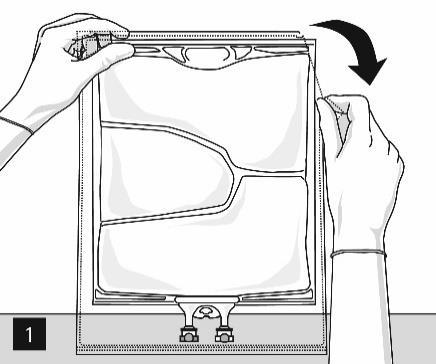
Visually inspect the inner bag for any signs of leakage. A leaking bag should be discarded, as sterility cannot be guaranteed.
Mixing the bag contents and adding additional substances
To sequentially open the chambers and mix their contents, roll the bag with both hands, starting from the weld separating the upper chamber (glucose) and lower chamber (amino acids) (Fig. 2).
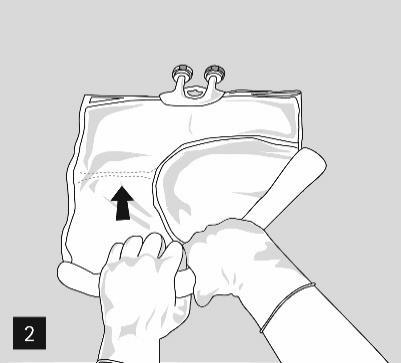
Then, continue to press to open the weld separating the middle chamber (fat) and the lower chamber (Fig. 3).
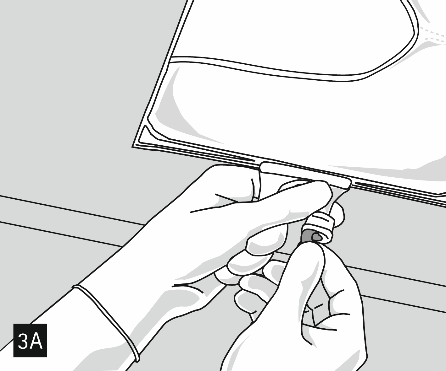
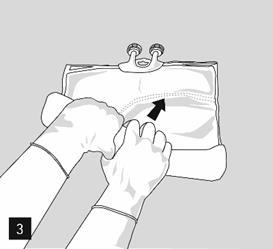
After mixing the contents of all chambers and removing the aluminum foil (Fig. 3A), compatible additives can be added through the drug port (Fig. 4). Thoroughly mix the contents (Fig. 5) and visually inspect the mixture (Fig. 6). The mixture is a homogeneous milky white emulsion of the oil-in-water type. Any signs of phase separation of the emulsion are not acceptable.
- Omegaflex peri can be mixed with the following additives up to the specified upper limits of concentration or maximum amount of additives after supplementation. The resulting mixtures are stable for 7 days at a temperature of 2°C to 8°C plus 2 days at 25°C.

Electrolytes: consider the electrolytes already present in the bag; in the three-component mixture, stability has been demonstrated up to a total of 200 mmol/l of sodium + potassium (together), 9.6 mmol/l of magnesium, and 6.4 mmol/l of calcium.
Phosphate: stability has been demonstrated up to a maximum concentration of 20 mmol/l of inorganic phosphate.
Alanyl-glutamine up to 24 g/l.
Trace elements and vitamins: stability has been demonstrated using commercially available products containing a large number of trace elements and vitamins (e.g., Tracutil, Cernevit) up to the standard dose recommended by the respective manufacturer of the micronutrient product.
Detailed information on the above-mentioned additives and the corresponding shelf-life of such mixtures can be obtained on request from the manufacturer.
Preparing for infusion
Before infusion, the emulsion should be warmed to room temperature.
Remove the aluminum cap from the infusion port (Fig. 7) and connect the infusion set (Fig. 8). Use an infusion set without an air vent or cover the air vent if using a set with an air vent. Hang the bag on an infusion stand (Fig. 9) and perform the infusion using standard technique.
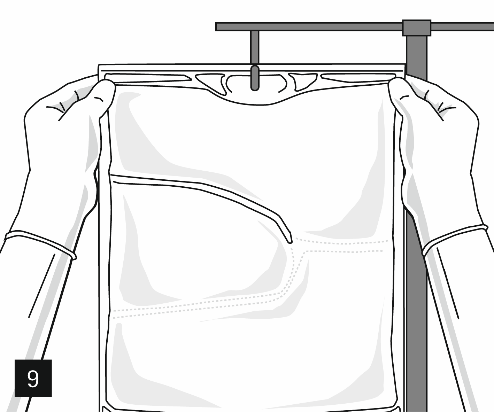
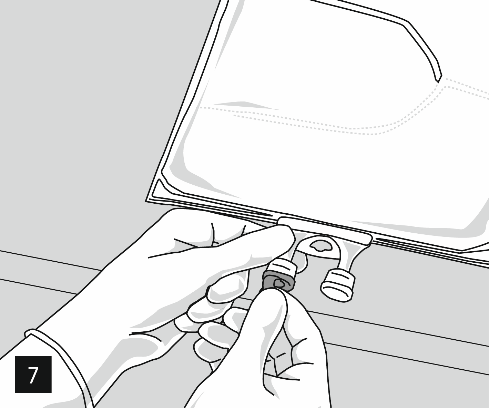
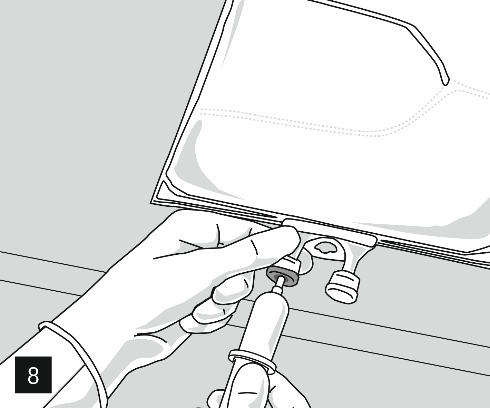
For single use only. After use, the packaging and any unused product should be discarded.
Any unused medicinal product or waste material should be disposed of in accordance with local regulations.
Do not reconnect partially used containers.
If filters are used, they must be fat-permeable (pore size ≥ 1.2 µm).
Shelf-life after opening the outer bag and after mixing the bag contents
Chemical and physicochemical stability of the mixed amino acid, glucose, and fat mixture has been demonstrated before use for 7 days at 2-8°C and for an additional 2 days at 25°C.
Shelf-life after adding compatible additives
From a microbiological point of view, the product should be used immediately after adding additives. If the product is not used immediately after adding additives, the responsibility for the storage period and storage conditions before use lies with the user.
After the first opening (puncture of the infusion port)
The emulsion should be used immediately after opening the packaging.
Omegaflex peri should not be mixed with other medicinal products for which compatibility has not been demonstrated.
Due to the risk of pseudoagglutination of Omegaflex peri, it should not be administered simultaneously with blood through the same infusion set.
- Country of registration
- Active substance
- Prescription requiredYes
- Manufacturer
- ImporterB. Braun Melsungen AG
- This information is for reference only and does not constitute medical advice. Always consult a licensed doctor before taking any medication. Oladoctor is not responsible for medical decisions based on this content.
- Alternatives to Omegaflex periDosage form: Solution, -Active substance: combinationsPrescription not requiredDosage form: Solution, -Active substance: combinationsPrescription not requiredDosage form: Solution, -Active substance: combinationsPrescription not required
Alternatives to Omegaflex peri in other countries
The best alternatives with the same active ingredient and therapeutic effect.
Alternative to Omegaflex peri in Spain
Alternative to Omegaflex peri in Ukraine
Online doctors for Omegaflex peri
Discuss dosage, side effects, interactions, contraindications, and prescription renewal for Omegaflex peri – subject to medical assessment and local rules.














